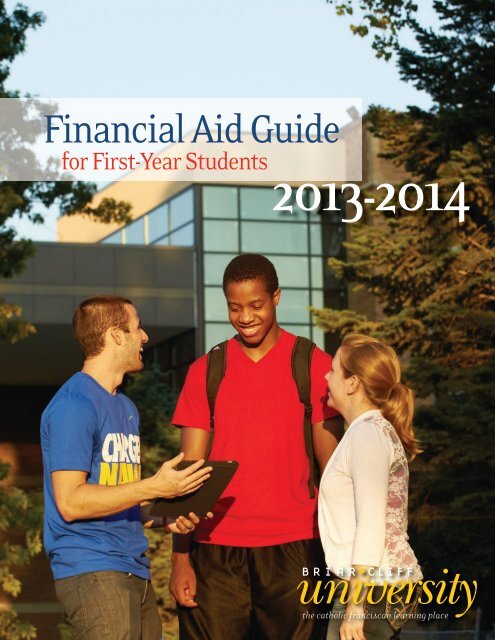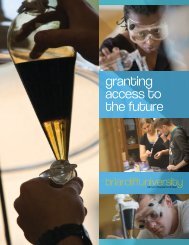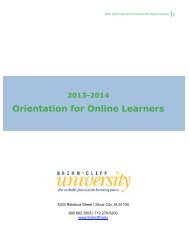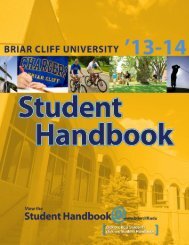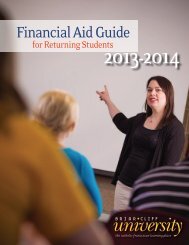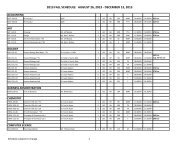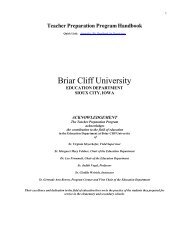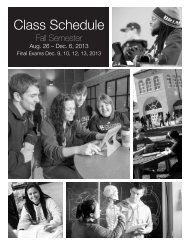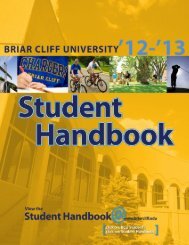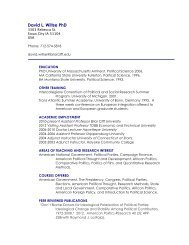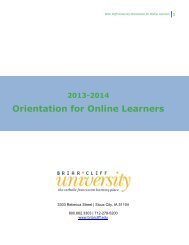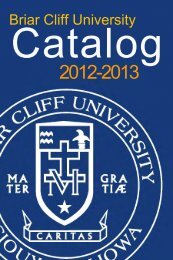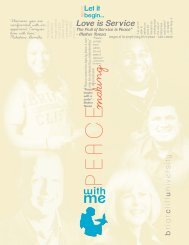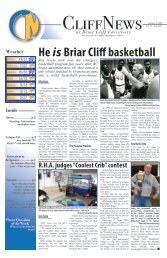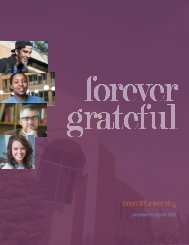Financial Aid Guide - Briar Cliff University
Financial Aid Guide - Briar Cliff University
Financial Aid Guide - Briar Cliff University
Create successful ePaper yourself
Turn your PDF publications into a flip-book with our unique Google optimized e-Paper software.
Table of Contents2013-2014 Costs ..........................................................................................................................................22013-2014 <strong>Financial</strong> <strong>Aid</strong> Deadlines and Consumer Information......................................................32013-2014 Cost Planning Worksheet..................................................................................................... 4Gift-<strong>Aid</strong> – <strong>Briar</strong> <strong>Cliff</strong> Academic, Athletic, Institutional Grants........................................................ 5Federal & State Work-Study .................................................................................................................... 5Federal & State Grant Programs ............................................................................................................ 6Federal Loan Programs............................................................................................................................. 7PLUS/Private Educational Loans........................................................................................................... 8Some Questions to Consider Before Selecting a Private Loan......................................................... 9Federal PLUS Loan or Private Educational Loans – Which Is Better?........................................... 10Special Circumstances............................................................................................................................ 11Outside Scholarships............................................................................................................................... 11BCU Payment Plans and Billing Procedures.......................................................................................12Satisfactory Academic Progress............................................................................................................132013-2014 BCU <strong>Financial</strong> <strong>Aid</strong> Booklet | 1<strong>Financial</strong> <strong>Aid</strong> Policy Regarding Withdrawal.......................................................................................15Contact Information...............................................................................................................Back Cover
2013-2014 Undergraduate CostsTuitionFull-time Tuition.............................................................................................................................................................................$25,464/$12,732 per semesterStandard Fees ......................................................................................................................................................................................... $1,186/$593 per semesterWellness Fee.................................................................................................................................................................................................. $110/$55 per semesterThere is no separate price for J-Term. It is included in the spring semester billing.Resident Hall ChargesAlverno Hall (double) .......................................................................................................................................................................$3,730/$1,865 per semesterNoonan Hall (double) .......................................................................................................................................................................$3,730/$1,865 per semesterToller Hall (double) ............................................................................................................................................................................$3,730/$1,865 per semesterResident Meal Plans135 Meals + 470 Flex ........................................................................................................................................................................$3,930/$1,965 per semester180 Meals + 360 Flex..........................................................................................................................................................................$3,930/$1,965 per semester225 Meals + 275 Flex ........................................................................................................................................................................$3,930/$1,965 per semester300 Meals + 240 Flex ........................................................................................................................................................................$4,230/$2,115 per semesterEstimated Direct Costs (average tuition, fees, room and board)........................................................................................................................... $34,420Books.................................................................................................................................................................................................................................................$1,100Estimated Indirect CostsIndirect costs are related costs that most students incur. Costs not included in the <strong>University</strong> bill include transportation and personal/miscellaneous expenses. Miscellaneous fees,* which may be on BCU billing are listed below. <strong>Briar</strong> <strong>Cliff</strong> provides an estimate of thesecosts to students for convenience and planning purposes.Estimated Indirect Costs ............................................................................................................................................................................................................$3,316Cost of Attendance 2013-2014 Academic Year .............................................................................................................................................................. $38,726*Athletic Fee ..................................................................................................................................................................................................................................... $240*Parking (if registering a vehicle)..................................................................................................................................................................................................$60*Loft Rental (if applicable)............................................................................................................................................................................................................ $1292013-2014 BCU <strong>Financial</strong> <strong>Aid</strong> Booklet | 2
2013-2014 <strong>Financial</strong> <strong>Aid</strong> DeadlinesMarch 15, 2013Priority deadline for maximum financial aid consideration.July 1, 20132012-2013 Free Application for Federal Student <strong>Aid</strong> (FAFSA) must be received by the Federal Processor on orbefore this date to be considered for Iowa Tuition Grant for Iowa residents for 2013-2014 year.Aug. 1, 2013All requested documents and forms must be submitted to the <strong>Financial</strong> <strong>Aid</strong> Office by this date to ensure thatfunds awarded to a student will be available by the start of the fall semester.Nov. 1, 2013Students who are enrolled only for fall semester should finalize their financial aid file by this date or jeopardizetheir chances of receiving aid. A student’s financial aid file must be complete (i.e., all forms and documentssubmitted and error-free) to allow the financial aid office adequate time to process financial aid for fall semester.Any documents and forms received after this date will be processed, if time permits, but the availability offinancial aid (grants, loans, etc.) for fall semester only is not guaranteed.Dec. 13, 2013Jan. 2-18, 2014J-TermThe end of fall semester. For students who plan to enroll only for fall semester, no aid can be processed afterthis date.Costs for J-Term included with spring semester billingFeb. 1, 2014Applications for summer financial aid are now available and online.March 15, 20142014-2015 FAFSA must be received by the Federal Processor on or before this date to be considered for firstpriority for financial aid for 2014-2015.March 15, 2014Deadline to turn in <strong>Briar</strong> <strong>Cliff</strong> Scholarship Application for annual or endowed scholarships.April 1, 2014Students jeopardize their chances of receiving aid for spring semester if they have not finalized their financial aidfile by this date.A student’s financial aid file must be complete (i.e., all forms and documents submitted and error-free) toallow the <strong>Financial</strong> <strong>Aid</strong> Office staff adequate time to process financial aid for the 2013-2014 academic year.Any documents or forms received after this date will be processed, if time permits, but the availability offinancial aid (grants, loans and more) for the 2013-2014 academic year is not guaranteed.May 16, 2014The end of spring semester. No aid can be processed after this date for the 2013-2014 academic year.2013-2014 BCU <strong>Financial</strong> <strong>Aid</strong> Booklet | 3Consumer InformationFederal law requires colleges and universities that offer federal financial aid to provide consumer information for prospective students.Consumer information for <strong>Briar</strong> <strong>Cliff</strong> <strong>University</strong> is located on the <strong>Briar</strong> <strong>Cliff</strong> website at http:// www.briarcliff.edu/campus/consumer_info.aspx . This is where you will find more information about BCU’s Academic Programs and Policies, Enrollment Information, Student<strong>Financial</strong> Assistance, Campus Security, Health and Wellness, Athletics, Job Placement, among other information.
Estimated <strong>Financial</strong> <strong>Aid</strong> WorksheetTotal Cost: Fall Semester Spring Semester Total/Academic YearTuition & Fees $ _____________ $ _____________ $ _____________Resident Hall Charge $ _____________ $ _____________ $ _____________Resident Meal Plan $ _____________ $ _____________ $ _____________Health Insurance (if applicable) $ _____________ $ _____________ $ _____________Athletic Fee (if applicable) $ _____________ $ _____________ $ _____________Parking (if applicable) $ _____________ $ _____________ $ _____________Books (approx.) $ _____________ $ _____________ $ _____________Loft Rental Fee (if applicable) $ _____________ $ _____________ $ _____________Approx. Amount Due Each Semester: $ $ $<strong>Financial</strong> <strong>Aid</strong>: Fall Semester Spring Semester Total/Academic YearList aid from AwardLetter except work-study._________________________ $ _____________ $ _____________ $ ______________________________________ $ _____________ $ _____________ $ ______________________________________ $ _____________ $ _____________ $ ______________________________________ $ _____________ $ _____________ $ ______________________________________ $ _____________ $ _____________ $ ______________________________________ $ _____________ $ _____________ $ ______________________________________ $ _____________ $ _____________ $ ______________________________________ $ _____________ $ _____________ $ ______________________________________ $ _____________ $ _____________ $ ______________________________________ $ _____________ $ _____________ $ _____________<strong>Financial</strong> <strong>Aid</strong> Available Per Semester: $ $ $Total Per Year<strong>Financial</strong> <strong>Aid</strong>Balance DueApprox. Balance Due Each Semester$ _____________$ _____________$ _____________$ _____________Additional Options:Payment Plan $ _____________ $ _____________ $ _____________Plus Loan $ _____________ $ _____________ $ _____________Alternative Loan $ _____________ $ _____________ $ _____________Work-Study $ _____________ $ _____________ $ _____________013-2014 BCU <strong>Financial</strong> <strong>Aid</strong> Booklet | 4
2013-2014 BCU <strong>Financial</strong> <strong>Aid</strong> Booklet | 5Gift-<strong>Aid</strong>Presidential ScholarshipsThe Presidential Scholarship is a full-tuition scholarship. MinimumACT 26 or 1170 SAT and a 3.75 cumulative grade point average (GPA)are required. Students are awarded based on academic qualification,demonstrated leadership and an interview with <strong>University</strong> officials. TheIowa Tuition Grant will be deducted from the Presidential Scholarship.Recipients must maintain full-time status, live on campus and maintaina 3.0 GPA to renew the scholarship.Academic AwardThe <strong>Briar</strong> <strong>Cliff</strong> Academic Achievement Award is based on high schoolGPA and ACT/SAT scores. This award ranges from $2,500-$16,000on campus and $1,500-$12,000 off campus. To renew the award forthe next academic year, students must meet Satisfactory AcademicProgress Standards. This award is adjusted for residents or commuters.If awarded as an on campus student and the student moves offcampus, the award will be adjusted to off campus amount. Studentsmust be full-time (at least 12 hours) each semester to receive funding.Saint Francis ScholarshipThe Saint Francis Scholarship is designed for students whodemonstrate a high level of leadership. The scholarship ranges from$500 to $6,000. Minimum ACT 24 or SAT 1090 and a 3.25 GPA arerequired. An interview with <strong>University</strong> officials is required.Athletic Scholarships<strong>Briar</strong> <strong>Cliff</strong> <strong>University</strong> offers athletic scholarships in the following sports:men’s and women’s basketball, cross country, golf, soccer, track,tennis, baseball, football, wrestling, softball and volleyball. Athletesmust meet the GPA requirements listed in the Satisfactory AcademicProgress Standards. Recipients must maintain full-time status.Art/Music/Theater ScholarshipsStudents who have auditioned or presented a portfolio may beconsidered for awards in art, music and theatre. Awards can berenewed based on participation or guidelines set by the appropriatefaculty member. Recipients must maintain full-time status.<strong>Briar</strong> <strong>Cliff</strong> <strong>University</strong> GrantThis grant is awarded to students who have demonstrated financialneed and have completed the FAFSA. Awards vary based on need.Students who live on campus and filed a FAFSA by March 15, 2013have highest priority. Students may lose this award if they moveoff-campus.Alumni ScholarshipThis $1,000 award is given to students who have a parent whograduated from <strong>Briar</strong> <strong>Cliff</strong> <strong>University</strong>. This award can be renewed up tofour years if the student is a full-time day-time student.Connection ScholarshipThis is a $1,000 schoalrship exclusively for high school seniors and newtransfer students who have graduated from a Catholic high school inthe Sioux City Diocese. This award is automatically renewed for up tofour years if the student is a full-time day student.BCU Annual and Endowed Scholarships<strong>Briar</strong> <strong>Cliff</strong> recognizes students who have compiled outstanding recordsof scholastic achievement, displayed exceptional leadership qualitiesand/or developed remarkable talents. These awards will be givenat the discretion of the appropriate department. Non-compliancewith the requirements of the private scholarships will result in theplacement of a “hold” on the student’s account delaying registrationfor the next semester.Federal & State Work-StudyFederal and State Work-StudyThe Federal and State Work-Study programs provide students anopportunity to work on campus or in a few positions located offcampusin the community. Being awarded work-study is not aguarantee of a job. Students at BCU apply for and obtain their ownjobs. Students with a Federal or State Work-Study award are givenpriority for positions, provided they have the required qualifications.A few examples of jobs available at BCU are library staff, office supportstaff, food service employees and athletic ticket sales. Students willhave the opportunity to attend a job fair in the fall and can also reviewany work study positions on the Student Employment portal.Students generally work between 5-10 hours per week to earntheir work-study awards which range from $500 to $3,000 per year.Currently work-study wages begin at $7.25 per hour and increasebased on the responsibilities required for the position. Work-studyearnings are subject to federal and state income taxes, but in mostcases are not subject to FICA tax. Income earned from work-study ismade available to students in the form of a paycheck, direct depositinto a bank account or as a payment toward a student’s bill. It is upto the student to decide how, or if, work-study earnings will be usedto pay the student’s bill. Employment earnings are paid twice eachmonth. Work-study listed on the financial aid award letter will notshow up as a credit on a Student’s tuition bill.
Federal & State Grant ProgramsEligibility for the following federal and state grant programs is based on the results of the FAFSA. Need-based grant programs are availableto students who demonstrate exceptional financial need.Federal Pell GrantThe Federal Pell Grant provides financial assistance that does not have to be repaid by eligible students. Application is made by completingthe FAFSA. The Federal Pell Grant program provides grants to full-time and part-time undergraduate students and may be used at anyeligible college or university. The award may vary according to the number of credit hours a student is enrolled. Students must be enrolledfor at least 12 hours per semester to receive a full award. The maximum award for the 2013-2014 academic year is $5,635. Federal Pell Granteligibility is based on need and the funding level approved by Congress.Federal Supplemental Educational Opportunity Grant (SEOG)The Federal SEOG program is for students who show exceptional financial need. Students showing exceptional need, who are PellGrant eligible and filed FAFSA by March 15 have highest priority status. These limited federal funds are dependent on Congressionalappropriations and are awarded by the <strong>University</strong> in varying amounts.Teacher Education Assistance for College and Higher Education (TEACH) GrantThe Federal TEACH Grant is for students that will be teaching in a low-income school and in a high need field of study. The student couldreceive a grant of up to $4,000 for four years as an undergraduate and for two years as a graduate.To qualify for a TEACH Grant students must:• Be a U.S. citizen or eligible non-citizen• Complete the FAFSA; however, financial need is not a requirement• Score above the 75th percentile on ACT/SAT or maintain a GPA of at least 3.25• Be enrolled as an undergraduate or a graduate student• Be enrolled in coursework that is necessary to begin a career in teaching in an identified high need field• Sign a TEACH Grant Agreement to Serve (ATS) to teach in a low-income school and in a high need field full-time for four academic yearswithin eight calendar years after completion or withdrawal from the academic program for which the TEACH Grant was received. ATS islocated at www.teach-ats.ed.gov and low-income schools at https://www.tcli.ed.gov/CBSWebApp/tcli/TCLIPubSchoolSearch.jsp. Ifservice obligation is not met, the grant funds will be converted to a Federal Direct Unsubsidized Loan that must be repaid with interestcharged from the date of each TEACH Grant disbursement.Iowa Tuition GrantThe ITG is available to qualified Iowa residents who are enrolled in at least three credit hours at a private institution in Iowa. The ITG is basedon need, and students must have a FAFSA at the federal processors by July 1, 2013, to be considered. The maximum ITG is $4,000 for the2013-2014 academic year. In the event that available state funds are insufficient to pay the full amount of each approved grant, the IowaCollege Student <strong>Aid</strong> Commission has the authority to administratively reduce the award.2013-2014 BCU <strong>Financial</strong> <strong>Aid</strong> Booklet | 6
Federal Loan ProgramsFederal Direct LoanA Federal Direct Loan is a long-term, fixed rate loan made to students.Typically, every student who files a FAFSA is eligible to borrow aFederal Direct Loan. Students may qualify to have a portion of theirfederal loan eligibility subsidized based on their financial need asdetermined by the FAFSA. A student must be enrolled at leasthalf-time (six credits) to be eligible to receive a Federal Direct Loan.SubsidizedThe Federal Direct Subsidized Loan is awarded to students whodemonstrate financial need as determined by the FAFSA. Interest ona Federal Direct Subsidized Loan is paid by the federal governmentwhile the student is enrolled at least half-time (six credits). InterestRate: 3.4%UnsubsidizedThe Federal Direct Unsubsidized Loan is not a need-based loan.Interest accrues on this loan prior to repayment. The student has theoption to make interest payments during the in-school period, or toallow the accrued interest to be capitalized (added on) to the principalbalance. Interest Rate: 6.8%How to Obtain a Federal Direct LoanThe <strong>Financial</strong> <strong>Aid</strong> Office at <strong>Briar</strong> <strong>Cliff</strong> automatically awards FederalPerkins and Direct Loans based on financial aid eligibility, which isdetermined by the FAFSA.Federal Direct LoansTo obtain a Federal Direct Subsidized and/or Federal DirectUnsubsidized Loan students must accept the loan(s) on their awardletter.All first time borrowers are required to complete a Master PromissoryNote (MPN) in order to borrow funds through the Direct LoanProgram.To complete the MPN, please visit www.studentloans.gov.Annual and Aggregate LimitsDependentAnnual Limit$5,500 – freshman (up to $3,500 may be subsidized)$6,500 – sophomore (up to $4,500 may be subsidized)$7,500 – junior and senior (up to $5,500 may be subsidized)IndependentAnnual LimitDependent annual limit plus:$4,000 – freshman and sophomore (always unsubsidized)$5,000 – junior and senior (always unsubsidized)Aggregate Limit$31,000 – dependent limit (no more that $23,000may be subsidized)$57,500 – independent limit (no more than $23,000may be subsidized)Fees and Repayment TermsFees1% origination feeRepayment TermTypically 10 years, begins six months after studentgraduates or drops below half-time enrollment(fewer than six credits).Entrance counseling is also required by the Federal Governmentfor first time borrowers. To complete an entrance counselingsession, visit www.studentloans.gov.2013-2014 BCU <strong>Financial</strong> <strong>Aid</strong> Booklet | 7Federal Perkins LoanA student’s <strong>Financial</strong> <strong>Aid</strong> Award Letter may list eligibility for the FederalPerkins Loan program. He/she must follow the steps below to securethe funds.1. Complete the statement of Rights and Responsibilities and Personal/Confidential Information Form. These forms will be given tostudents to complete during Summer Orientation or on ValidationDay.2. All new students at <strong>Briar</strong> <strong>Cliff</strong> <strong>University</strong> who are participating in theFederal Perkins Loan Program must complete entrance counselingprior to receiving loan funds. This can be done at Validation Dayor by appointment with the Perkins Loan Manager in the BusinessOffice located in Noonan Hall.3. Federal Perkins Loan funds will be credited to the student’s accountafter Steps 1 and 2 above have been completed.• Federal Perkins Loans are made directly through <strong>Briar</strong> <strong>Cliff</strong><strong>University</strong> with funds provided jointly by the <strong>University</strong> and thefederal government. The interest rate is fixed at 5%.• The amount of the Perkins Loan depends upon available fundsand financial need as determined by the results of the student’sFAFSA.• The federal government pays the interest as long as the studentis enrolled at least half-time and through the nine-month graceperiod.• The standard repayment period is 10 years. Institutions mayextend the repayment period for the Deferred Perkins Loan up to10 additional years for low-income individuals.• Deferments may be available in certain situations, suchas military involvement, volunteer service in a private nonprofit,Vista or Peace Corps-type organizations. When students enterrepayment status, certain cancellation provisions are available.
PLUS/Private Educational LoansFederal Direct Parent PLUS LoansFor families who need to borrow beyond the Federal Direct Loan limits, the Parent PLUS Loan is an excellent option. The Federal Direct ParentPLUS Loan is available for parents to borrow on behalf of dependent undergraduates who are enrolled at least half-time (six credits), a creditanalysis is required.Interest Rate: 7.9%Annual Limit:Fees:RepaymentTerm:Total cost of education less any other financial aid received4% origination feeUp to 10 years, principal and interest repayment begins 30 to 60 days after final disbursement.When a Federal Direct Parent PLUS Loan is Denied Due to Parent’s CreditIf a Federal Direct Parent PLUS Loan is denied because of a parent’s credit history, families have two options: parents may secure a creditworthyendorser (co-signer) for their PLUS Loan or the student may borrow an additional Federal Direct Unsubsidized Loan. For information about theprocess of using an endorser, the parent should contact the Direct Loan Servicer at 800-557-7394. To apply for the Federal Direct UnsubsidizedLoan in the student’s name, contact BCU’s <strong>Financial</strong> <strong>Aid</strong> Office. Under this option, the student is limited to borrowing a maximum of an additional$4,000 if he/she is a freshman or sophomore and an additional $5,000 if he/she is a junior or senior.How to Obtain a PLUS LoanFederal Direct Parent PLUS LoansTo apply for a Federal Direct Parent PLUS Loan the parent must complete the Federal Direct Parent PLUS Application/Credit Authorization Formlocated at www.briarcliff.edu/prospective_students/fin_aid_forms.aspx. The form will be used by the <strong>Financial</strong> <strong>Aid</strong> Office to initiate theapplication and credit authorization with the U.S. Dept. of Education on the parent’s behalf. The parent borrower listed on the application/creditauthorization must sign an online MPN at www.studentloans.gov using their FAFSA PIN before any loan funds may be requested.Private Education LoansA <strong>Briar</strong> <strong>Cliff</strong> education is one of the best investments you can make. It is important that you review all types of loans you may want to chooseto help enable you to pay for educational and living expenses necessary to receive your college degree. Private Educational Loans are availableto help families fill the gap for college expenses. Supplemental loans should never be your primary funding source. Exhaust all of your otheroptions including <strong>Briar</strong> <strong>Cliff</strong>’s no interest payment plan, savings, summer work, work study and outside scholarships before you borrow any typeof a private education loan.You can find a listing of preferred lenders by going to https://choice.fastproducts.org/FastChoice/Welcome.do?configid=1292969376410These lenders offer private non-federally funded educational loans. Please review the loan application disclosure for each loan before makingyour decision. This is not a comprehensive list of lenders. <strong>Briar</strong> <strong>Cliff</strong> will process any educational loan that you as the consumer are interested in.For most students the best loan options are the Federal Direct Student Loan Program(eligible amounts are on your financial aid award letter).<strong>Briar</strong> <strong>Cliff</strong> will not certify a private education loan on your behalf until you have exhausted your federal and state aid options.We are required to disclose the maximum Title IV grants and loan assistance available to you.The maximum available grants and loans are listed below:• Federal Pell Grant• Federal SEOG Grant• Federal TEACH Grant• Federal Stafford Loan• Federal Perkins Loan• Federal Parent PLUS Loan$5,550$4,000$4,000$5,500 Freshmen, $6,500 Sophomores, $7,500 Junior/Seniors,$20,500 Graduate Students. Independent Undergraduate studentscan receive an additional $4,000 as Freshmen and Sophomores, and$5,000 as Juniors and Seniors.$5,500 undergraduatesCost of Attendance minus other financial aid.2013-2014 BCU <strong>Financial</strong> <strong>Aid</strong> Booklet | 8
Some Questions to Consider BeforeSelecting a Private LoanThe following are some of the questions that should be considered as you research private loan options.1. When should I apply for a private loan? It is recommended that you apply for a private loan four to six weeks before payment is due. Be sureto follow-up with the lender to ensure that you have completed all necessary paperwork. It is important to read all correspondence that isreceived from the lender as they often request additional information to fully underwrite a loan.2. What is the interest rate and how often does that rate change? Interest rates on private student loans are generally variable and can changemonthly or quarterly. Most rates are determined by using a financial standard such as Prime or LIBOR plus a margin that is usually based onthe creditworthiness of a borrower and cosigner.3. Is the lender charging fees for processing the loan? Some lenders charge up-front origination fees that are a percentage of the loan, whileothers may charge repayment fees. If fees are taken out of the loan proceeds, you are still responsible for paying back the full loan amountincluding the fees.4. Do I need a cosigner on the private loan? Most loans require a credit-worthy cosigner. Even if a cosigner is optional, one is recommended asit will usually yield a lower interest rate for the borrower.5. How often is interest capitalized on the loan? Capitalization is adding accrued interest to the principal balance. The more frequently a loan iscapitalized, the costlier it will be to the borrower.6. Am I required to make interest payments on the loan while I’m in school? Some lenders do require interest only payments while theborrower is in school. Making these payments will reduce the overall cost of the loan and can be done even if the lender does not require it.If the lender is requiring these payments, it is important that you have the ability to make those payments.7. Does the lender have a yearly or cumulative (aggregate) borrowing limit? As you evaluate what you need to borrow over your four years,keep these limits in mind.8. Can I borrow from more than one lender? If possible, it is recommended that you stay with one private lender throughout your collegecareer. This should make the process of repaying loans more efficient.9. Are there any borrower benefits associated with the loan? Many lenders offer benefits for a certain number of on-time payments, paymentsreceived through electronic funds transfer and even graduation. Some lenders also offer possible release of cosigners after making a certainnumber of on-time payments.10. What are the repayment terms on the loan? Generally, most loans have a six-month grace period after graduation before repayment begins.The length of repayment period varies by lender and usually ranges from 10 to 30 years.2013-2014 BCU <strong>Financial</strong> <strong>Aid</strong> Booklet | 911. Can this loan be deferred while in graduate school? This will vary by lender, but most often they can be if the borrower is enrolled at leasthalf time. Some lenders do have caps on the maximum number of months loans can be deferred.
Federal PLUS or Private Educational Loans –Which Is Better?The decision of whether or not to borrow additional loans is a difficult one for some families. Before making any decisions, the <strong>Financial</strong> <strong>Aid</strong> Officeencourages families to consider the differences between the Federal Direct Parent PLUS Loan and other private educational loans.FEATUREInterest RateBorrowerLoan AmountsFeesRepayment TermsQualifyingFEDERAL DIRECT PARENT PLUS LOANFixed 7.9%Parent: Loan is in parent’s name. Loan is non-transferable.Up to the cost of student’s education less other financial aid.4% origination feeGenerally repayment begins within 60 days after full disbursement.Length of repayment: 10 years from the start of principal payments.Based on credit history; debt-to-income ratiois not considered, making it easier to qualify.PRIVATE EDUCATIONAL LOANSVariable, usually no cap. Many programs reset monthly or quarterly.Usually based on a consumer index (prime, commercial paper, LIBOR)plus a margin.Student: While loan is in student’s name, usually parent is included as aco-signer. Cosigner bears equal responsibility for the loan repayment.Minimum and maximum borrowing limits vary from lender to lender.Fees vary from lender to lender. May include origination and/orrepayment fees.Interest accrues while student is in school. Some programs requirestudents to make minimum monthly payments or interest onlypayments while in school. If deferred, repayment usually begins sixmonths after student graduates or leaves school. Length of repaymentvaries, usually 10-30 years.Varies from lender to lender but often debt-to incomeratio is considered in credit decision.Affect onCredit ReportDeferment/ForbearanceCancellationWill show as debt on credit report of parent.Parent borrowers may request deferment of principal and interestpayments as long as their student is enrolled atleast half-time. Unemployment and economic hardship may alsoqualify parent for deferment or forbearance.Loan discharged if parent or student dies or has total andpermanent disability.Will show as debt on credit report of student andco-signer.Usually not available, but some lenders may offer.Check with lender for details.Loan usually not discharged if student borrower becomes disabled ordeceased.2013-2014 BCU <strong>Financial</strong> <strong>Aid</strong> Booklet | 10
Special CircumstancesIf there are special circumstances that affect the ability to pay for educational expenses, students may submit a Professional Judgment Form.To apply, download the application at www.briarcliff.edu/prospective_students/fin_aid_forms.aspx or contact the <strong>Financial</strong> <strong>Aid</strong> Office tohave one mailed. The form lists all areas which can be considered. Please note that costs associated with lifestyle choices or consumer debt (i.e.,house or car payments, living without roommates, credit card purchases) and changes in income due to overtime and gambling losses cannotbe taken into consideration.Acceptable reasons to file a Special Circumstance Application include:• Death or disability of a parent or spouse• Divorce or separation of parent or student• Medical, dental or dependent care expenses not reimbursedby insurance or by an employer’s pre-tax cafeteria plan• Unemployment• Loss of Social Security benefits and/or child support• Business or farm closed due to bankruptcy, foreclosure ornatural disaster• Private high school, junior high or elementary tuitionexpenses for other family members• Parents’ or spouse’s personal college loan payments• Parent enrolled in college in 2013-2014 and payingout-of-pocket college tuition expensesOutside ScholarshipsThis past year, <strong>Briar</strong> <strong>Cliff</strong> <strong>University</strong> received just over $280,000 in privatescholarships awarded by local foundations, community agencies, clubs,social and fraternal organizations, parents’ employers, and others. Thesescholarships are awarded based on a variety of factors, such as financialneed, academic achievement, ethnicity, community involvement,leadership, career plans, and fields of study. It is truly worth the student’stime to search for these opportunities.ReportingStudents receiving funding from outside sources must notify the <strong>Financial</strong><strong>Aid</strong> Office of these additional funds. If we are required to revise financialaid due to a student’s receipt of other resources, the student’s FederalDirect loan(s) or work-study award will be adjusted first. Contact the<strong>Financial</strong> <strong>Aid</strong> Office with questions about how aid received from outsidesources may affect the overall aid package. Students may report theiroutside scholarships on the Outside <strong>Aid</strong> Information Form which isenclosed with your <strong>Financial</strong> <strong>Aid</strong> Award.DisbursementIn most cases, the scholarship donor will provide specific details regardinghow and when the funds will be disbursed or if students are required tosubmit any documentation to the donor before any funds will be released.2013-2014 BCU <strong>Financial</strong> <strong>Aid</strong> Booklet | 11If the donor sends a check to the student, he/she should endorse thecheck, if needed, and forward it to the <strong>Financial</strong> <strong>Aid</strong> Office. If the donorsends the check to the <strong>Financial</strong> <strong>Aid</strong> Office, the student will be contactedby e-mail if the scholarship check requires his/her signature. Privatescholarship checks will be applied to the student’s account as they arereceived.Unless the donor provides specific instructions, private scholarships lessthan $250 will be credited to the student’s account in full. Scholarshipsof $251 or more will be credited to the student’s account in two equaldisbursements during the fall and spring semesters provided the studentis are enrolled full time.
BCU Payment Plans & Billing ProceduresPayment of AccountsBCU’s payment policy requires all semester charges to be paid by the first day of classes. A bill may be paid through personal resources orAutomatic Bill Payment Plan. If the student is applying for an alternative loan or a Federal Direct PLUS Loan to cover the difference, thatis also acceptable. All current charges must be paid before registering for a new semester. The <strong>University</strong> reserves the right to disenroll astudent for non-payment.Personal ResourcesPayment by most major credit cards may be made in person, by telephone or by mail. Checks and money orders should be made payableto <strong>Briar</strong> <strong>Cliff</strong> <strong>University</strong>. Please include the student account number on all payments.Automatic Bill Payment PlanBCU offers an automatic bill payment plan which allows students to make automatic payments on their student account viaauto-debit. The plan generally begins in September and runs for 10 months; however, it is possible to start at any time. Contact theBusiness Office at (712) 279-5440 for more information.When Is <strong>Financial</strong> <strong>Aid</strong> Credited to Your Account?Grants and BCU ScholarshipsGrants and scholarships will be credited to the student’s account no earlier than 10 days prior to the start of the term, if his/her financialaid file is complete.Federal Perkins LoansFederal Perkins Loans will be credited to the student’s account no earlier than 10 days after the start of the term, if his/her requiredpaperwork is completed.Other Student LoansMost student loans will be disbursed in half. BCU will receive half of the loan proceeds at the beginning of the fall and spring semesters.Student EmploymentEarnings from student employment may be credited to the student’s account once a job is secured, all required paperwork is completedand wages are earned. When completing the employment paperwork, the student determines what percentage of his/her earnings willbe applied to the account. Earnings are paid twice monthly in a paycheck or direct deposit to the student’s bank account.2013-2014 BCU <strong>Financial</strong> <strong>Aid</strong> Booklet | 12
Satisfactory Academic Progress2013-2014 BCU <strong>Financial</strong> <strong>Aid</strong> Booklet | 13The Higher Education Act of 1965, as amended, requires that eachstudent maintains satisfactory progress in his or her pursued course ofstudy to receive Title IV Federal <strong>Financial</strong> <strong>Aid</strong>. At <strong>Briar</strong> <strong>Cliff</strong> <strong>University</strong>,these standards are also applied to state and institutional programs.Students attending full-time have a maximum of five academic yearsto complete a program of study at BCU. Students will only receivestate funding for four academic years. If the student’s major requiredadditional completion time, a fifth year of institutional funding can beallowed.Academic Progress will be measured both qualitatively andquantitatively. A minimum GPA and a minimum number of credit hourscompleted in the academic year are requirements (see chart below)If a student does not meet thegrade point average requirementfor SAP, they will receive a Warningnotification for one semester.Students unable to achieve therequired grade point average aftera second consecutive semesterwill be placed on <strong>Financial</strong> <strong>Aid</strong>Suspension. Students can also beplaced on <strong>Financial</strong> <strong>Aid</strong> Suspensionafter two semesters for notcompleting 70% of the hours theyattempted.End-of-SemesterGrade Point AverageRequirementsSemester 1Semester 2Semester 3Semester 41.51.751.902.0Students placed on <strong>Financial</strong> <strong>Aid</strong>Suspension have the right to appeal the suspension. The suspensionform is mailed to the student to complete. The appeal will requirethe reasons for the suspension and an Academic Plan which must besigned off by the student’s Academic Advisor. The student will havea time frame to have the document completed and submitted to the<strong>Financial</strong> <strong>Aid</strong> Office so a decision can be made. Student’s who aregranted approval will be placed on <strong>Financial</strong> <strong>Aid</strong> Probation. After theprobationary semester the student will either be in good standing orwill not be able to receive any federal, state or institutional funds untilthey are in good standing again.Eligibility can also be terminated when the credit hours required fora specific degree/program are earned or the student has attemptedgreater than 150% of the credit hours required for a specific degreeprogram.Transfer StudentsTransfer students will be assumed to be maintaining satisfactoryacademic progress at the time of admission. Transfer credits and GPAthat are accepted at <strong>Briar</strong> <strong>Cliff</strong> are counted toward the total attemptedcredit/cumulative GPA in determining satisfactory academic progresscompliance.Repeated CourseworkWhen students repeat a course, the most recent grade received is usedin the calculation of the cumulative GPA unless the student performsworse. In that case, the better of the two grades is counted towardcumulative GPA.Non-Credit CourseworkNon-credit coursework is not counted in the minimum creditrequirement. In the event that a student fails to successfully completecourses at the minimum level, the student will be placed on <strong>Financial</strong><strong>Aid</strong> Probation. A student in this category may receive financial aid forone additional semester. If the student does not meet the minimumlevels by the end of the warning period, the student is consideredto be making unsatisfactory progress and is placed on <strong>Financial</strong> <strong>Aid</strong>Suspension.<strong>Financial</strong> <strong>Aid</strong> Suspension means the termination of all financial aidexcept private loans. The <strong>Financial</strong> <strong>Aid</strong> Office evaluates the progressof each student according to these standards on an annual basis. If astudent is placed on <strong>Financial</strong> <strong>Aid</strong> Suspension, that student will havethe opportunity to appeal the suspension. A student will receivenotification of suspension and an Appeals Document. The appealscommittee will review the student’s request and notify the student ofits decision in writing.Changes in Academic LoadDuring the first week of each semester, called “Validation Week,”students will have an opportunity to change their registration or room/board plan with no financial penalty. After Validation Week, there willbe no adjustment to tuition or financial aid if the student drops a classor changes to a different room/board plan.Students who completely withdraw from the <strong>University</strong> may be alloweda refund on tuition, fees, room/board (if applicable). Federal and stateregulations require that all or a portion of the refund be returned tothe appropriate government aid programs. Refunds on behalf of thefederal aid recipients must be returned in the following order: FederalDirect Unsubsidized Loans, Federal Direct Subsidized Loans, FederalPerkins Loan, Federal Grad PLUS, Federal Direct PLUS, Federal Pell Grant,Federal SEOG, TEACH Grant, other Title IV aid.
Satisfactory Academic ProgressFor students who fail to make satisfactoryacademic progressLevel 1: WarningThe first time a student fails to meet the requirements for SAP asoutlined in the previous section:1. Written notification is sent to the student’s permanent address(as on file in the <strong>Financial</strong> <strong>Aid</strong> Office).2. No further action is taken by the <strong>Financial</strong> <strong>Aid</strong> Office and noneis required by the student.3. The student’s SAP record is set at “Warning” and failure to meetSAP requirements in a future measurement period will flag thestudent for further action.Level 2: SuspensionIf a student was previously at “Warning” level and fails to meetrequirements for SAP for a second semester in succession:3. If the appeal is approved, notification will be sent to thestudent telling them what is required of them each semester.(normally a “Plan of Action” is developed stating what gradepoint average and credit hours that need to be completed willbe outlined for the student each semester). The student in thissituation is now placed on “Probation” and his or her financialaid will be reinstated for the following measurement period(semester).4. If the student chooses not to appeal or the appeal is deniedthe student’s SAP record is set at “Termination” and his or herfinancial aid will remain suspended and will not be reinstateduntil he or she has successfully met SAP requirements for themeasurement period (semester).Level 3: TerminationIf a student was previously at “Probation” level and again fails tomeet the requirements for SAP at any point in the future:1. The student’s financial aid is suspended indefinitely.1. The student’s financial aid is suspended2. Written notification, outlining the appeals process is sent tothe student’s permanent address (as on file in the <strong>Financial</strong><strong>Aid</strong> Office).2. Written notification is sent to the student’s permanent address(as on file with the <strong>Financial</strong> <strong>Aid</strong> Office).3. <strong>Financial</strong> <strong>Aid</strong> may be reinstated on a case-by-case basis and onlyif the student first meets SAP requirements at <strong>Briar</strong> <strong>Cliff</strong> fora measurement period (semester) or received adequate gradesfrom another institution, which indicates the student is ready tocontinue in good standing.2013-2014 BCU <strong>Financial</strong> <strong>Aid</strong> Booklet | 14
<strong>Financial</strong> <strong>Aid</strong> Policy Regarding WithdrawalReturn of Title IV (Federal) <strong>Aid</strong>If a student withdraws from <strong>Briar</strong> <strong>Cliff</strong> <strong>University</strong> during a semesteror summer session, a calculation of “earned” vs. “unearned” federalaid must be determined. This federal policy assumes students earntheir aid based on how much time has elapsed in the semester. Ifstudents receive federal financial aid, that aid may be reduced as aresult of withdrawal.There are three steps that <strong>Briar</strong> <strong>Cliff</strong> must complete to complywith federal policy: determine the withdraw date, determine theamount of earned federal aid, and return unearned federal fundsto the appropriate program(s). However, in order to ensure that thestudent is eligible to receive financial aid, <strong>Briar</strong> <strong>Cliff</strong> must first verifywith instructor(s) that the student has attended or participated inacademic activities related to his/her class(es) for the semester.Students must officially withdraw by visiting the Registar’s Office. AWithdraw Form will need to be completed by key areas on campusand then returned to the Registrar’s Office. The withdraw date isthe date the student begins the withdraw process. If students failto withdraw officially, the withdraw date will become the midpointof the semester, unless the <strong>University</strong> can document a later date.In certain circumstances if an earlier date of last academic activityis determined, this date may be used in the calculation of “earned”federal aid.If students withdraw before completing 60% of the semester, their“earned” federal funds are in direct proportion to the length of timethey were enrolled. The percentage of “earned” aid is determinedby dividing the total number of calendar days enrolled by the totalnumber of calendar days in the semester. If the student completes60% of the term, he/she earns all federal financial aid for the semester.The responsibility to repay unearned aid is shared by BCU andthe student. The <strong>University</strong>’s share is the lesser of unearned aidor unearned institutional charges. The <strong>University</strong>’s share must berepaid to the federal aid programs before the student’s share isconsidered.The order of the Return of Title IV funds is Federal DirectUnsubsidized Loan, Federal Direct Subsidized Loan, Federal PerkinsLoan, Federal GRAD PLUS, Federal Direct Parent PLUS Loan, FederalPell Grant, Federal Supplemental Education Opportunity Grant,Teacher Education Assistance for College and Higher EducationGrant (TEACH), other Title IV programs. Institutional aid is adjustedbased on the percentage of refund applicable at the time ofwithdrawal. State aid is adjusted based on the percentage of refundapplicable at the time of withdrawal.portion be reduced by 50%. A satisfactory payment arrangementcan be made with <strong>Briar</strong> <strong>Cliff</strong> <strong>University</strong>.If a student stops attending classes in any given semester withoutofficial notification, he/she will be considered “unofficially”withdrawn. An example would be a student who receives onlyfailing grades for a semester. The withdrawal date for a studentwho unofficially withdraws will be the midpoint of the periodof enrollment or the last documented day of academicallyrelated activity, whichever is later. No refund will be granted forwithdrawals that occur after 60% of the enrollment period haspassed. If students without government aid unofficially withdraw,no adjustments will be made.Institutional & State <strong>Aid</strong> Refund PolicyThe Return of Title IV aid calculation, as cited above, only considersfederal funds. If a student officialy withdraws prior to completing60% of the semester, institutional and State <strong>Aid</strong> will be refundedbased on the percentage of the semester that has not beencompleted. After the 60% point of the semester, no refund willbe granted nor will financial aid be reduced. The portion of thesemester completed is based on calendar days from the first dayof the semester through the last scheduled day of finals, includingweekends and breaks of less than five days.If a student withdraws during the first week of the semester andreceives a 100% tuition refund on all courses, all funding must bereturned to the appropriate aid programs.To officially withdraw, a student must complete a Withdrawl Form,which can be obtained in the Registrar’s Office.2013-2014 BCU <strong>Financial</strong> <strong>Aid</strong> Booklet | 15If a student is required to repay a portion of his/her loan throughthe student’s share calculation, he/she will not be expected toreturn those funds immediately, but rather when repayment beginsaccording to the terms and conditions of the promissory note. Ifthe student share includes grant funds, federal rules allow the grant
Contact Information<strong>Financial</strong> <strong>Aid</strong>With questions on financial aid awards and/or eligibility,please call (712) 279-5200 or (800) 662-3303, ext. 5200. Toschedule an appointment with BCU’s <strong>Financial</strong> <strong>Aid</strong> Office,please call (712) 279-5200.Business Office – Student AccountsWith questions on billing and payment options, please call(712) 279-5440 (800) 662-3303, ext. 5440. Or write to us at:<strong>Briar</strong> <strong>Cliff</strong> <strong>University</strong> , <strong>Financial</strong> <strong>Aid</strong> Office, 3303 RebeccaStreet, Sioux City, Iowa 51104.the catholic franciscan learning placewww.briarcliff.edu


